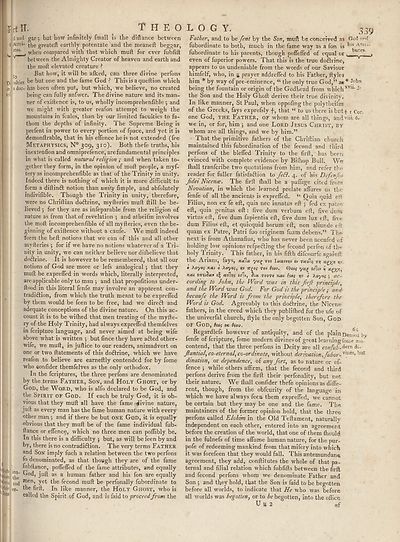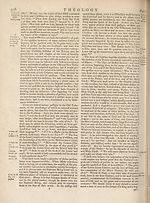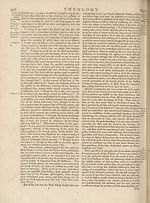Encyclopaedia Britannica, or, a Dictionary of arts, sciences, and miscellaneous literature : enlarged and improved. Illustrated with nearly six hundred engravings > Volume 20, SUI-ZYM
(381) Page 339
Download files
Complete book:
Individual page:
Thumbnail gallery: Grid view | List view

|| rt II. T H E O
J and gar •, but bow infinitely fmall is the diftance between
I } Attri- jjjg greateft earthly potentate and the meaneft beggar,
I ites' , when compared wdth that which mull for ever fublift
i between the Almighty Creator of heaven and earth and
the moll elevated creature ?
But how, it will be alked, can three divine perfons
Di ulties be but one and the fame God ? Thisisaquellion which
in s doc- has been often put, but which, we believe, no created
tri being can fully anfwer* The divine nature and its man¬
ner of exiftence is, to us, wholly incomprehenlible •, and
we might with greater reafon attempt to weigh the
mountains in fcales, than by our limited faculties to fa¬
thom the depths of infinity. The Supreme Being is
prefent in power to every portion of fpace, and yet it is
demonllrable, that in his effence he is not extended (fee
Metaphysics, N° 309, 310). Both thefe truths, his
inextenlion and omniprefence, are fundamental principles
in what is called natural religion ; and when taken to¬
gether they form, in the opinion of moll people, a myf-
tery as incomprehenfible as that of the Trinity in unity.
Indeed there is nothing of which it is more difficult to
form a dillinfl notion than unity fimple, and abfolutely
indivifible. Though the Trinity in unity, therefore,
were no Chrillian doflrine, mylleries mull Hill be be¬
lieved ; for they are as infeparable from the religion of
nature as from that of revelation ; and atbeifm involves
the moll incomprehenfible of all mylleries, even thebe-
ginning of exiltence without a caufe. We mull indeed
form the bell notions that we can of this and all other
mylleries ; for if we have no notions whatever of a Tri¬
nity in unity, wre can neither believe nor diffielieve that
doctrine. It is however to be remembered, that all our
notions of God are more or lefs analogical ; that they
mull be expreffed in words which, literally interpreted,
are applicable only to man j and that propolitions under-
Hood in this literal fenfe may involve an apparent con-
tradidlion, from which the truth meant to be exprelled
by them would be feen to be free, had we direfl and
adequate conceptions of the divine nature. On this ac¬
count it is to be wifhed that men treating of the mylle-
ry of the Holy Trinity, had always expreffed themfelves
in fcripture language, and never aimed at being wife
above what is written j but fince they have added other-
wife, we mull, in jullice to our readers, animadvert on
one or two llatements of this dodlrine, which we have
reafon to believe are earnellly contended for by fome
who eonfider themfelves as the only orthodox.
In the fcriptures, the three perfons are denominated
by the terms Father, Son, and Holy Ghost, or by
God, the Word, who is alfo declared to be God, and
the Spirit of God. If each be truly God, it is ob¬
vious that they mull all have the fame divine nature,
juft as every man has the fame human nature with every
other man ; and if there be but ONE God, it is equally
obvious that they mud be of the fame individual fub-
Hance or elfence, which no three men can poffibly be.
In this there is a difficulty $ but, as will be feen by and
by, there is no contradidlion. The very terms Father
and Son imply fuch a relation between the two perfons
io denominated, as that though they are of the fame
Sub bibflance, pofleffed of the fame attributes, and equally
;ion ^ G°d, juft as a human father and his fon are equally
reco an(i men> yet the fecond mull be perfonally fubordinate to
:hir er_ the firft. In like manner, the Holy Ghost, who is
called the Spirit of God, and is faid to proceed from the
LOGY. 33
Father, and to be fent by the Son, mull be conceived as God
fubordinate to both, much in the fame way as a fon is *11S AtUi
fubordinate to his pai'ents, though poffeffed of equal or
even of fuperior powers. That this is the true doflrine,
appears to us undeniable from the words of our Saviour
himfelf, who, in j prayer addrefled to his Father, ftyles
him * by way of pre-eminence, “ the only true God,” a« * John
being the fountain or origin of the Godhead from which xv^‘
the Son and the Holy Ghoft derive their true divinity.
In like manner, St Paul, when oppofing the polytheifm
of the Greeks, fays exprefsly -j-, that “ to us there is butf r Cor.
one God, the Father, of whom are all things, andviir. 6.
we in, or for, him j and one Lord Jesus Christ, by
whom are all things, and we by him.”
That the primitive fathers of the Chrillian church
maintained this fubordination of the fecond and third
perfons of the bleffed Trinity to the firft, has been
evinced with complete evidence by Biftiop Bull. We
Ihall tranfcribe two quotations from him, and refer the
reader for fuller fatisfadlion to Je6l. 4. of his Dcfe nfio
Jidei Nicenee. The firrt Ihall be a paflage cited from
Novation, in which the learned prelate aflures us the
fenfe of all the ancients is expreffed. “ Quia quid ell
Filius, non ex fe eft, quia nec innatus eft 5 fed ex patio
eft, quia genitus eft : five dum verbum eft, five dum
virtus eft, five dum fapientia eft, five dum lux eft, five
dum Filius eft, et quicquid horum eft, non aliunde eft
quam ex Patre, Patri fuo originem fuam debens.” The
next is from Athanafius, who has never been accufed of
holding low opinions refpefling the fecond perfon of the
holy Trinity. This father, in his fifth difcourfe againft
the Arians, fays, ko[\cc xcv laxww ev txuIy, tjj x*
« axt 0 Xoyo;, yv Trpof rov 6itv. ©g«{ yxg erliv x vgy,*.,
*.xi iTrt^x* aet/Jus eir]*, oix tovto xmi nv 0 Aoyaj ; ac¬
cording to John, the Word was in this firfl principle,
and the Word was God. For God is the principle ; and
becaufe the Word is from the principle, therefore the
Word is God. Agreeably to this doiftrine, the Nicene
fathers, in the creed which they publiffied for the ufe of
the univerfal church, ftyle the only begotten Son, God
of God, hot; tx 6icv.
Regardlefs however of antiquity, and of the plain Demtd by
fenfe of fcripture, fome modern divines of great learning forae mo-
contend, that the three perfons in Deity are all confub-^^
fantial, co-eternal, co-ordinate, without derivation, fubor- vines’ but
dination, or dependence, of any fort, as to nature or ef¬
fence $ while others affirm, that the fecond and third
perfons derive from the firft their perfonality, but not
their nature. ^Ve ffiall confider thefe opinions as diffe¬
rent, though, from the obfeurity of the language in
which we have always feen them expreffed, we cannot
be certain but they may be one and the fame. The
maintainers of the former opinion hold, that the three
perfons called Elohim in the Old Teftament, naturally
independent on each other, entered into an agreement
before the creation of the world, that one of them ffiould
in the fulnefs of time affume human nature, for the pur-
pofe of redeeming mankind from that mifery into which
it was forefeen that they would fall. This antemundane;
agreement, they add, conftitutes the whole of that pa¬
ternal and filial relation which fubfifts between the firft
and fecond perfons whom we denominate Father and
Son \ and they hold, that the Son is faid to be begotten
before all worlds, to indicate that He who was before
all worlds was begotten, or to begotten, into the office
UU2 «f
J and gar •, but bow infinitely fmall is the diftance between
I } Attri- jjjg greateft earthly potentate and the meaneft beggar,
I ites' , when compared wdth that which mull for ever fublift
i between the Almighty Creator of heaven and earth and
the moll elevated creature ?
But how, it will be alked, can three divine perfons
Di ulties be but one and the fame God ? Thisisaquellion which
in s doc- has been often put, but which, we believe, no created
tri being can fully anfwer* The divine nature and its man¬
ner of exiftence is, to us, wholly incomprehenlible •, and
we might with greater reafon attempt to weigh the
mountains in fcales, than by our limited faculties to fa¬
thom the depths of infinity. The Supreme Being is
prefent in power to every portion of fpace, and yet it is
demonllrable, that in his effence he is not extended (fee
Metaphysics, N° 309, 310). Both thefe truths, his
inextenlion and omniprefence, are fundamental principles
in what is called natural religion ; and when taken to¬
gether they form, in the opinion of moll people, a myf-
tery as incomprehenfible as that of the Trinity in unity.
Indeed there is nothing of which it is more difficult to
form a dillinfl notion than unity fimple, and abfolutely
indivifible. Though the Trinity in unity, therefore,
were no Chrillian doflrine, mylleries mull Hill be be¬
lieved ; for they are as infeparable from the religion of
nature as from that of revelation ; and atbeifm involves
the moll incomprehenfible of all mylleries, even thebe-
ginning of exiltence without a caufe. We mull indeed
form the bell notions that we can of this and all other
mylleries ; for if we have no notions whatever of a Tri¬
nity in unity, wre can neither believe nor diffielieve that
doctrine. It is however to be remembered, that all our
notions of God are more or lefs analogical ; that they
mull be expreffed in words which, literally interpreted,
are applicable only to man j and that propolitions under-
Hood in this literal fenfe may involve an apparent con-
tradidlion, from which the truth meant to be exprelled
by them would be feen to be free, had we direfl and
adequate conceptions of the divine nature. On this ac¬
count it is to be wifhed that men treating of the mylle-
ry of the Holy Trinity, had always expreffed themfelves
in fcripture language, and never aimed at being wife
above what is written j but fince they have added other-
wife, we mull, in jullice to our readers, animadvert on
one or two llatements of this dodlrine, which we have
reafon to believe are earnellly contended for by fome
who eonfider themfelves as the only orthodox.
In the fcriptures, the three perfons are denominated
by the terms Father, Son, and Holy Ghost, or by
God, the Word, who is alfo declared to be God, and
the Spirit of God. If each be truly God, it is ob¬
vious that they mull all have the fame divine nature,
juft as every man has the fame human nature with every
other man ; and if there be but ONE God, it is equally
obvious that they mud be of the fame individual fub-
Hance or elfence, which no three men can poffibly be.
In this there is a difficulty $ but, as will be feen by and
by, there is no contradidlion. The very terms Father
and Son imply fuch a relation between the two perfons
io denominated, as that though they are of the fame
Sub bibflance, pofleffed of the fame attributes, and equally
;ion ^ G°d, juft as a human father and his fon are equally
reco an(i men> yet the fecond mull be perfonally fubordinate to
:hir er_ the firft. In like manner, the Holy Ghost, who is
called the Spirit of God, and is faid to proceed from the
LOGY. 33
Father, and to be fent by the Son, mull be conceived as God
fubordinate to both, much in the fame way as a fon is *11S AtUi
fubordinate to his pai'ents, though poffeffed of equal or
even of fuperior powers. That this is the true doflrine,
appears to us undeniable from the words of our Saviour
himfelf, who, in j prayer addrefled to his Father, ftyles
him * by way of pre-eminence, “ the only true God,” a« * John
being the fountain or origin of the Godhead from which xv^‘
the Son and the Holy Ghoft derive their true divinity.
In like manner, St Paul, when oppofing the polytheifm
of the Greeks, fays exprefsly -j-, that “ to us there is butf r Cor.
one God, the Father, of whom are all things, andviir. 6.
we in, or for, him j and one Lord Jesus Christ, by
whom are all things, and we by him.”
That the primitive fathers of the Chrillian church
maintained this fubordination of the fecond and third
perfons of the bleffed Trinity to the firft, has been
evinced with complete evidence by Biftiop Bull. We
Ihall tranfcribe two quotations from him, and refer the
reader for fuller fatisfadlion to Je6l. 4. of his Dcfe nfio
Jidei Nicenee. The firrt Ihall be a paflage cited from
Novation, in which the learned prelate aflures us the
fenfe of all the ancients is expreffed. “ Quia quid ell
Filius, non ex fe eft, quia nec innatus eft 5 fed ex patio
eft, quia genitus eft : five dum verbum eft, five dum
virtus eft, five dum fapientia eft, five dum lux eft, five
dum Filius eft, et quicquid horum eft, non aliunde eft
quam ex Patre, Patri fuo originem fuam debens.” The
next is from Athanafius, who has never been accufed of
holding low opinions refpefling the fecond perfon of the
holy Trinity. This father, in his fifth difcourfe againft
the Arians, fays, ko[\cc xcv laxww ev txuIy, tjj x*
« axt 0 Xoyo;, yv Trpof rov 6itv. ©g«{ yxg erliv x vgy,*.,
*.xi iTrt^x* aet/Jus eir]*, oix tovto xmi nv 0 Aoyaj ; ac¬
cording to John, the Word was in this firfl principle,
and the Word was God. For God is the principle ; and
becaufe the Word is from the principle, therefore the
Word is God. Agreeably to this doiftrine, the Nicene
fathers, in the creed which they publiffied for the ufe of
the univerfal church, ftyle the only begotten Son, God
of God, hot; tx 6icv.
Regardlefs however of antiquity, and of the plain Demtd by
fenfe of fcripture, fome modern divines of great learning forae mo-
contend, that the three perfons in Deity are all confub-^^
fantial, co-eternal, co-ordinate, without derivation, fubor- vines’ but
dination, or dependence, of any fort, as to nature or ef¬
fence $ while others affirm, that the fecond and third
perfons derive from the firft their perfonality, but not
their nature. ^Ve ffiall confider thefe opinions as diffe¬
rent, though, from the obfeurity of the language in
which we have always feen them expreffed, we cannot
be certain but they may be one and the fame. The
maintainers of the former opinion hold, that the three
perfons called Elohim in the Old Teftament, naturally
independent on each other, entered into an agreement
before the creation of the world, that one of them ffiould
in the fulnefs of time affume human nature, for the pur-
pofe of redeeming mankind from that mifery into which
it was forefeen that they would fall. This antemundane;
agreement, they add, conftitutes the whole of that pa¬
ternal and filial relation which fubfifts between the firft
and fecond perfons whom we denominate Father and
Son \ and they hold, that the Son is faid to be begotten
before all worlds, to indicate that He who was before
all worlds was begotten, or to begotten, into the office
UU2 «f
Set display mode to:
![]() Universal Viewer |
Universal Viewer | ![]() Mirador |
Large image | Transcription
Mirador |
Large image | Transcription
Images and transcriptions on this page, including medium image downloads, may be used under the Creative Commons Attribution 4.0 International Licence unless otherwise stated. ![]()
| Permanent URL | https://digital.nls.uk/192279500 |
|---|
| Description | Plates 516, 519 and 520 missing. |
|---|---|
| Attribution and copyright: |
|
| Description | Ten editions of 'Encyclopaedia Britannica', issued from 1768-1903, in 231 volumes. Originally issued in 100 weekly parts (3 volumes) between 1768 and 1771 by publishers: Colin Macfarquhar and Andrew Bell (Edinburgh); editor: William Smellie: engraver: Andrew Bell. Expanded editions in the 19th century featured more volumes and contributions from leading experts in their fields. Managed and published in Edinburgh up to the 9th edition (25 volumes, from 1875-1889); the 10th edition (1902-1903) re-issued the 9th edition, with 11 supplementary volumes. |
|---|---|
| Additional NLS resources: |
|

